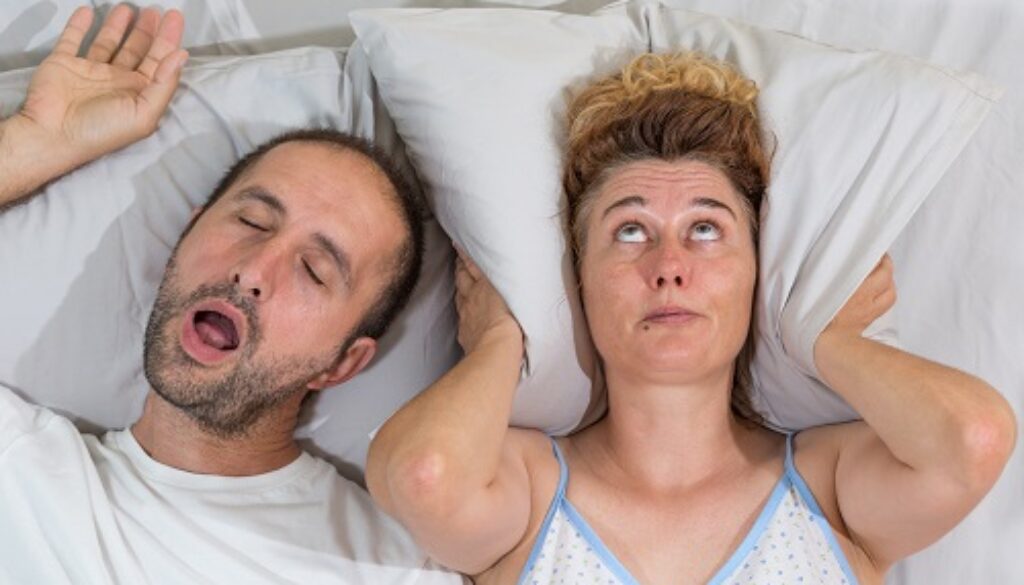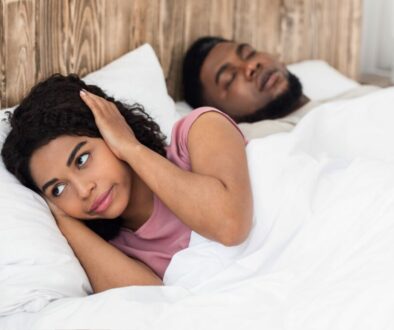Do You Have a Spouse Who Snores? Resolve to Get More Sleep in the New Year
The New Year brings many resolutions and hopes for a healthier 2018. Some of the most common ones we’ve heard all too often: the dedication to lose weight, to eat better and to finally take advantage of that gym membership. We believe there is something important that is often overlooked on that list: sleep.
Americans aren’t getting enough sleep, and it’s affecting every aspect of their lives.
According to the Centers for Disease Control, more than one-third of American adults are not getting enough sleep on a regular basis. Adults aged 18 to 60 should be getting at least seven hours of sleep every night. Those who don’t are putting themselves at risk for conditions such as diabetes, high blood pressure, stroke and even heart disease. In addition, lack of sleep often causes anxiety and mental–as well as physical–exhaustion.
Those who don’t experience quality sleep also report that they have poorer overall health, according to the National Sleep Foundation. According to their statistics:
- 45 percent of Americans say that in the past week, insufficient sleep has affected their day-to-day activities.
- 35 percent rate their sleep quality as “poor” or “fair.”
- 70 percent of men are snorers, compared to 24 percent of women
Snoring doesn’t just affect the one who snores. A spouse who “saws logs” during the night affects his or her partner’s quality of sleep. For the snorer, this condition is more than simply annoying, it can indicate sleep apnea.
What is sleep apnea?
Sleep apnea is a chronic condition that occurs when you stop breathing periodically during sleep. These pauses can be a few seconds long or sometimes as long as a minute, and they can occur more than 30 times an hour throughout the night. (National Heart, Lung, & Blood Institute)
While snoring is a primary symptom, not everyone who snores has sleep apnea. Other symptoms include:
- Gasping for air during the night
- Daytime drowsiness despite sleeping through the night
- Dry mouth or a sore throat
- Irritability
- Difficulty concentrating
- Memory problems
What to do if your spouse snores
Giving your partner a nudge during the night or encouraging him or her to turn over may be a temporary solution, but it’s not addressing the long-term problem or the complications that can result from sleep apnea.
If your spouse isn’t convinced that he or she snores, refer them to this online sleep apnea test from the American Sleep Apnea Organization.
Did you realize that your ear, nose and throat physician is uniquely qualified to help your spouse stop snoring? Sleep apnea is often the result of blocked airways or structural problems with the throat. Our professionals at Raleigh Capitol Ear, Nose and Throat have extensive experience helping those with a variety of sleep disorders.
Therefore, a visit to the ENT should be the first item on your list. Our ENTs will determine the exact cause and nature of the snoring. This may involve a sleep study or other tests. We’ll also check for any structural abnormalities that could be contributing to the problem.
Sometimes, a CPAP machine is needed to treat sleep apnea. CPAP stands for Continuous Positive Airway Pressure. CPAP machines deliver steady air pressure through a mask or nosepiece to help keep the airway open, and therefore eliminating snoring.
A CPAP machine may take a while to get used to, so be sure to offer encouragement and support to your spouse.
There are a few common challenges involved in using CPAP machines, according to the Mayo Clinic. Fortunately, these are easily fixed. A few tips include:
- Your husband or wife may have difficulty falling asleep when they first start CPAP. Help him or her get used to wearing the CPAP mask gradually by wearing it for short periods of time when awake.
- If your spouse has difficulty with the forced air pressure, you may opt to use a machine with a ramp feature that allows the gradual increase of air pressure. Speak to one of our ENTs for more information.
- Sometimes, a leaky mask can cause a dry stuffy nose. Be sure the mask fits properly. If this doesn’t resolve the problem, you may wish to use a CPAP device with a heated humidifier.
Tips for getting a good night’s sleep
Finding solutions for your spouse’s snoring is a huge step toward helping you get getting a great night’s sleep. However, even after sleep apnea is treated, it’s still important to practice the principles of good “sleep hygiene.” Following these steps can help ensure you get an adequate amount of quality rest:
- Be sure to avoid caffeine and other stimulants before bedtime.
- Use alcohol only in moderation.
- Don’t take daytime naps that are longer than 30 minutes—despite popular belief, naps do not compensate for inadequate nighttime sleep.
- Exercise regularly, though avoid working out too close to bedtime
- Ensure you’re exposed to natural light during the day—particularly if you have an office job and don’t get outside frequently.
- Try to go to sleep at the same time every night.
- Avoid electronic screens from cell phones, TVs or computers before bedtime
More information is available on sleep apnea
Interested in learning more about sleep apnea and solutions for snoring? You’ll find these blog posts useful and informative
Four Solutions for Sleep Apnea
Four Ways Sleep Apnea Can Be Deadly
How to Stop Snoring




